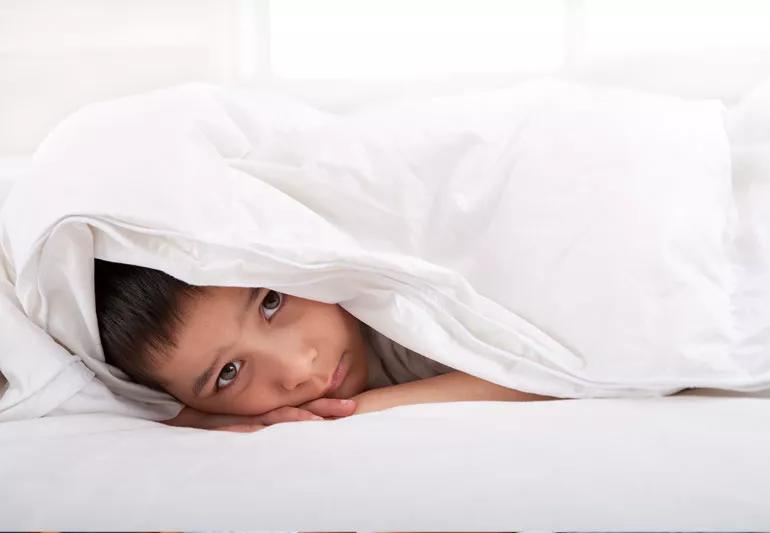Reduce frustration and get more sleep

You’re frustrated. You’re exhausted. Your child is already in school — but they’re still wetting the bed at night. You’ve tried limiting liquids after dinner. You’ve woken your child up in the middle of the night to use the bathroom. Still, no luck.
Advertisement
Cleveland Clinic is a non-profit academic medical center. Advertising on our site helps support our mission. We do not endorse non-Cleveland Clinic products or services. Policy
But you aren’t alone. Parents often worry about bedwetting in their children, a problem defined as “involuntary urination in children 5 years of age or older.” But in reality, about 15% of children in the U.S. are still wetting the bed at age 5.
To help parents deal with this challenge, we turned to pediatric nephrologist Charles Kwon, MD, and pediatric urologist Audrey Rhee, MD.
When your child is older than age 7 and still wetting the bed, you might want to talk with their primary care physician or a pediatric nephrologist or urologist.
Also, keep in mind that about 15% of children age 5 or older actually stop wetting the bed each year.
“When I meet a child who is wetting the bed, it’s twice as likely to be a boy. He usually presents with no other medical problems,” Dr. Kwon says.
“The underlying issue is usually a bladder that’s not yet matured,” says Dr. Kwon.
Other possible causes for bedwetting include hormone imbalance, constipation or more serious issues, shared below.
Your child may be at a higher risk for wetting the bed if:
Advertisement
To combat bedwetting, doctors suggest:
“Although there are medications (including a synthetic form of a hormone) that can address bedwetting, I don’t prescribe them unless a child was already put on the medication by another provider,” says Dr. Rhee.
“There are side effects,” she says. “Plus, it’s a temporary fix, a quick remedy, when what we want is an overall solution.”
Families often wonder if a child is bedwetting on purpose. Dr. Kwon often tells parents that it’s typically not their fault nor is it their child’s fault. “I tell them not to get too stressed because this issue often resolves on its own,” he says.
Dr. Rhee adds that it’s also important to talk to your child to see if there’s motivation to change. If they’re motivated to change, a bedwetting alarm can be the solution.
You can clip the alarm to your child’s underwear or place it on the pad on the bed. Once the device detects any moisture, the alarm goes off. But if your child isn’t independently motivated, the alarm may have no benefit and may just further frustrate the family.
“If they’re still sneaking drinks late at night and eating what they shouldn’t, then it doesn’t make sense to invest in an expensive bedwetting alarm. So, I directly ask a child if bedwetting bothers them, to find out if it’s the parents’ frustration that brought the child to the appointment or their own,” Dr. Rhee says.
Advertisement
As your child gets older and has opportunities to go to slumber parties and weekend trips, bedwetting can affect their confidence and social life. This’ll most likely motivate your child to solve the problem and avoid feeling embarrassed.
Occasionally, bedwetting is a sign of something more significant, including:
Bedwetting may be a sign of a sleep disorder, as well, in which case, a sleep study can be conducted.
If you have additional concerns about your child’s bedwetting, make an appointment with your pediatrician.
Advertisement
Learn more about our editorial process.
Advertisement

Adding extra formula, cereal or medications to your baby’s bottle is a dangerous and misguided practice

Teaching your baby to sign may help ease frustrations before they can talk, but it’s not a must-do

Babies can get congested easily, but you can calm their cough by keeping them hydrated, using nasal drops and running a humidifier

Try to burp your baby mid-feed and after they finish eating — but don’t sweat it if they don’t burp

Most babies will recognize their name by about 9 months old

Clean your baby’s mouth with a washcloth or small toothbrush if they have a tooth or you suspect thrush

‘Social smiles’ typically start around 8 weeks old, while laughter comes later — around 4 to 6 months

Most infants can roll from tummy to back by 6 months old — but remember, every child develops at their own pace

Wearing a scarf, adjusting your outdoor activities and following your asthma treatment plan can help limit breathing problems

Your diet in the weeks, days and hours ahead of your race can power you to the finish line

When someone guilt trips you, they’re using emotionally manipulative behavior to try to get you to act a certain way